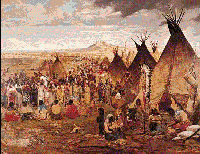|
Hohwoju
oyate eya wani ti pi icuhan
kangi wicasa kin sung manu ahi na óta
mawicanu pi na nakun
Lakóta winyan ko akiyagla pi.
Kangi wicasa ti pi heciya winyan
ki le aki pi ca titakuye wica kiksuye na
lila cante sice na ceya ke,
winyan ki ableza pi na heya pi ske,
"Sina ki le ena, woyute ki lena icu,
na wakpala ta inahma ye."
Hoca mni aglala inahma ke, na oiyokpaza
ca gla cu ke, icuhan sungmanitu
tanka nump el hipi na oksan hlo omanipi
ke, takinnas ena kte pi kta kecin
ke. Sungmanitu tanka ki waste ca pi ke ca
ob wancok wi yohinyanpata kiya si
glu hapi ke. Blaye cokan gla pi ehanl
osiceca tanka wan hihunni na icuhan
sungmanitu tanka a ke numb hel opa pi ke.
Hetan tehiya mani pi eyas
hecena gla pi, kangi wicasa
kanyela u pi k'on hetan kawinga pi.
Wooyake ki le wowas'ake yuha.
Lakóta winyan ki le osiceca ahi ca heon
kpapte. Tuwa osiceca icuhan omani ki
le wooyake ki kiksuye ehantans takuni
toka. Anpetu óta mani pi ehanl "Winuhcala Paha"
eya pica hel ihunni pi, iguga ohan
ohloka wan ca sungmanitu tanka ki winyan
ki etkita agla pi. Ohloka ki tima
iyaia yukan lila sicamna ke, ista ki
ecel itaya ca oksanksan etunwan
sungmanitu tanka ki ataya tima hpaya pi ke.
Tokinnas ahiyu pi na kiza pi kta
kecin eyas etan tahca wan
yaslohan yutimahel icupi ca ob wóta.
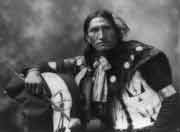
Sungmanitu
tanka ki lena ataya ti ospaye hecapi.
Wicooncage tona ataya hel
on pi. Hunh hoksi azin kiya hpaya pi.
Hunh tanktankpi ca hena wakuwa heca
pi. Hunh ocinsice k'on hena ti awanyanka pi.
Sungmanitu tanka wicahcala ki
ins cikcikala ki lena tokel wakuwa pi
hecel onspe wica kiya pi.
Ataya a'wan kica yanka pi.
Waniyetu ata hel ob wogla ke na iye nawicahun.
Winyan ki lila wakabla na pusye.
Sungmanitu tanka ki waste wicalake
na insiya wastelaka pi.
Winyan ki insiya sungmanitu tanka mna aya ke.
Sungmanitu tanka ki makoce ki le slolya pi.
Tohanl hu numpa ki opta hiyaya
pi can slolya pi, sungmanitu
tanka ki lena hu numpa ki iheyab sna ecun pi.
Lakóta ki tonka mna pi ca he wahtela pi sni.
Wana tinpsinla wasteste
ki walehanl winyan ki le hunku ki hehantan wasigla,
cuwintku ki t'a kecin.
Sungmanitu tanka ki ehake tunweya i pi ca hehan
winyan ki le hunku ki wanyanka pi ca okiyaka pi.
Winyan ki wancok taoyate ki
ekta gla cin, eyas hekta kiya ikikcu
pi ki he slolye sni. Sungmanitu
tanka ki heya pi, tohanl taoyate
el ki na, ob on kta ehantans
sina ki numpa koz si pi na e e ku cin,
ehantans wanjala kos si pi.
Wana, sungmanitu tanka ki kanyela hunku
ki wawopta keya pi ca winyan ki
etkiya iyaya. Ata kici yapi na ceya pi.
Sina ki numpa koza ca sungmanitu
tanka ki hektakiya kigla pi.
Ho, le winyan ki "Iguga Oti Win" eciya pi ca
ohloka ki he Lakóta ki wakan glawa pi. Wico'oyake
ki le wowos'ake ikoya ke ca waneyetu ehanl Olake ki
ungna osiceca wanji hihunni kte.
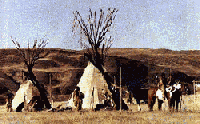
A
Minneconjou camp which had settled down for the
winter was raided by Crow Indians.
The Crow stole many horses and took a
Lakóta woman back to their camp.
The Lakóta woman was unhappy staying in the Crow camp.
She missed her people.
Some of the Crow women saw this and took pity on her.
They gave her food and a blanket and told
her to hide by a creek near the camp.
She hid herself in the bushes along the banks of the creek.
A short time later some of the Crow men came looking for her.
While the Lakóta woman was hiding, two wolves came upon her.
The wolves growled at her and circled around her.
The woman thought the wolves were going to kill her.
But the wolves treated her kindly and guided her along
where Crow were chasing them.
A raging blizzard caught the woman and
her wolf friends in the open prairie.
Two more wolves joined them as they walked
through the blowing snow.
The small wolf pack and
the woman struggled through
the snowdrifts and the cold winds.
There is power in this story.
The woman was able to get safely away from the
Crow because of the blizzard.
If one is travelling in a blizzard and
remembers this story - one need not be afraid.
After many days of traveling, the small band reached
Squaw Buttes near present day Opal, South Dakóta.
They came to a cave in the rocks
and
the wolves forced her inside.
The cave had an awful smell .
As her eyes adjusted to the darkness,
she saw many wolves in the large den.
She thought that the wolves would tear her apart.
Instead the wolves dragged her in a deer, tore
it apart and shared it with the woman.
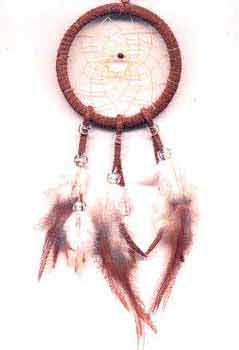
The wolves were one big family.
Many generations of wolves lived together in the cave.
Each wolf had its own place in the family.
The hunter wolves brought in the meat.
The mother wolf nursed their young.
The elder wolves taught the younger
wolves the skills of hunting.
The other wolves kept watch over the den.
In this way - they all looked after each other.
The woman made herself at home in the den.
She learned to speak and understand the wolves' language.
The woman would dry and store the meat for the winter.
She got along well with the wolves
and they got along well with her.
Soon she smelled just like the other wolves.
The wolves knew their country well.
They always knew whenever the two-legged ones passed through.
The wolves usually stayed away from the two- leggeds.
The wolves did not like the way they smelled.
At turnip digging time of the year -
the woman's mother was still mourning.
She thought that her daughter had been killed.
One day the hunter wolves saw the mother near the den.
The wolves went back and told the woman.
The woman wanted to go back to her people.
She was worried that they would not accept her back.
The wolves told her to wave her blanket two times if
she wanted to stay with her mother.
If she waved once
the wolves would come and take her back to the den.
When the mother saw her daughter coming
she was so happy to see her that she cried.
The woman waved her blanket twice to
the wolves who were watching her from the hills.
The wolves saw this and went back to their cave.
The woman's name became Iguga Oti Win
"Woman who lived in the rock".
The rock is now considered a sacred area to the Lakóta.
Be
Careful of this tale because if it is told on a winter
night it might cause a blizzard!
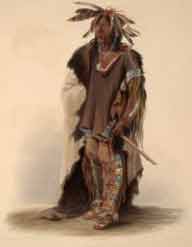
 Return to Indigenous Peoples' Literature
Return to Indigenous Peoples' Literature
Compiled by: Glenn Welker
This site has been accessed 10,000,000 times since February 8, 1996.
|
